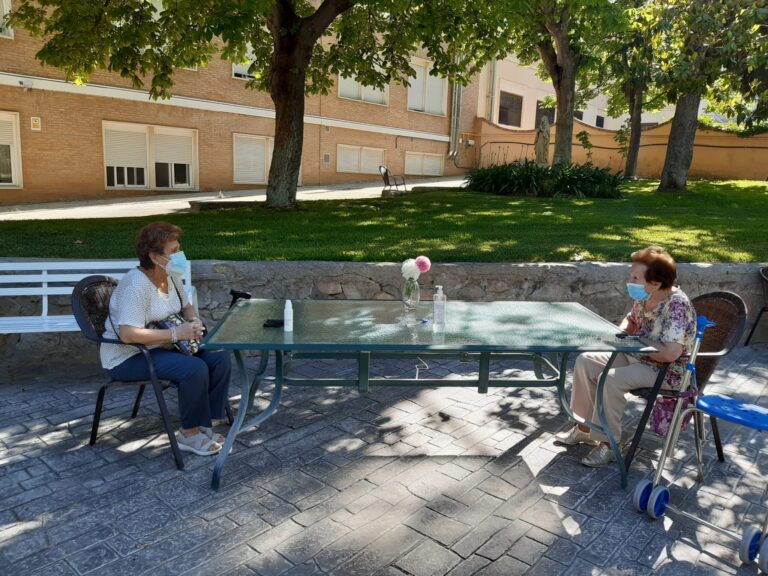In the week of the person who cares, we want to highlight the invaluable work of informal caregivers. These unsung heroes, mostly family members, friends or neighbors, take on the responsibility of caring for people who need help with their daily activities due to chronic illness, disability or aging. Although their role is essential in the lives of those they care for, they often face significant challenges without the recognition or support they deserve.
Who can be a caregiver?
In general, any person with the disposition and skills to care for another person in a situation of dependency can become a caregiver. In the case of informal caregivers, they are usually close relatives, such as children, spouses, parents or siblings of the person who needs care. They can also be friends, neighbors or other people in the close circle, who take on the task without receiving formal remuneration. Without professional training, the informal caregiver learns “on the fly” and adapts their skills to meet the specific needs of the person they care for.
How many types of caregiver are there?
There are different types of caregivers, and each one fulfills a specific role within the care system:
Informal Caregiver
He is someone who takes care of a person in a situation of dependency without receiving direct financial remuneration and without a formal employment relationship. This type of caregiver is usually a close family member and provides care in the home.
Professional Caregiver
Unlike the informal caregiver, the professional caregiverhas received specific training and is remunerated for their services. Their role is to provide specialized support, generally at home or in care institutions.
Primary Caregiver
In many cases, a single person assumes the majority of caregiving responsibility. This figure is the primary caregiver, who dedicates more time and has greater involvement in the daily care of the dependent person.
Secondary Caregiver
The secondary caregiver assists the primary caregiver and supports them with specific tasks or when the primary caregiver needs a break. Their role is essential in providing “respite” to those who do most of the care.

The importance of the informal caregiver in the health system
Informal caregivers are a key piece within the health system, since they reduce demand in hospitals, residences and other care centers. In countries like Spain, where the population is aging at a rapid rate, the work of these caregivers is even more crucial. Without them, many dependent people would not be able to stay in their homes, a factor that contributes to their well-being and quality of life.
Featured data:
- Approximately 80% of long-term care in Europe is provided by informal caregivers, saving millions of euros annually in health and social costs.
- The majority of these caregivers are direct family members and, in many cases, the profile corresponds to women between 45 and 65 years old, who usually combine this work with their jobs and family responsibilities.
Challenges and challenges of the informal caregiver
The dedication of an informal caregiver involves sacrifices and challenges that affect various areas of your life. Some of the most common challenges are:
-
Physical and emotional exhaustion: Care tasks, especially those related to dependent people or those with complex illnesses, can be exhausting. Caregivers usually spend many hours carrying out activities such as mobilization, hygiene or medical support, which generates significant physical and emotional wear.
-
Impact on mental health: According to studies, informal caregivers have a high risk of suffering from depression and anxiety. Constant demands and lack of time for oneself contribute to the appearance of these mental health problems.
-
Financial burden: Although they do not receive remuneration, they often incur additional expenses, such as medications, transportation, and home adaptations. This can create significant economic pressure, especially for those who must reduce their work hours or leave their jobs in order to care for family members.
-
Social isolation: Commitment to caregiving can lead caregivers to reduce or abandon their social life, generating feelings of isolation and loneliness.
- Lack of training: Most informal caregivers do not have the necessary training to deal with complex situations, such as handling medical equipment or administering medications, which can increase their stress level.
Support strategies for the informal caregiver
Faced with these challenges, it is essential that informal caregivers receive the necessary support to carry out their work without putting their own well-being at risk. Some key strategies to support caregivers include:
-
Access to training resources: Training in basic care, first aid and emotional management can help caregivers feel safer and reduce their stress load. There are specific courses and workshops that teach everything from how to mobilize a bedridden person to how to deal with emergency situations.
-
Emotional support and support groups: Support groups allow caregivers to share their experiences, get advice and receive emotional support. These spaces are essential to combat social isolation and foster a support network.
-
Financial and legal advice: The financial situation of carers can be improved through public aid, subsidies and advice on employment rights and early retirement options for those who must reduce their working hours. In addition, some autonomous communities in Spain offer subsidies and financial support programs for informal caregivers.
-
Family Respite Services: Respite services provide periods of temporary respite for caregivers. These services may include home care or short stays in specialized centers, allowing the informal caregiver to rest and attend to their own needs without neglecting their family member.
- Social awareness and sensitization: Society must recognize and value the role of the informal caregiver. Awareness campaigns, such as the Day of the Person Who Cares, are essential to give visibility to their work and foster a culture of support for them.
The role of informal caregiver not only involves dedication and personal sacrifice, but can often lead to family tensions, especially between siblings who share responsibility for caring for their elderly parents. These conflicts are common and can be an additional challenge for those who assume the role of caregiving. To learn more about how to manage these situations, consult this article on conflicts between siblings over the care of elderly parents.






